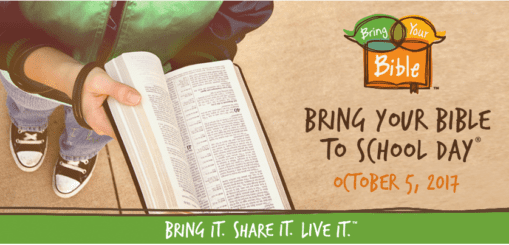
In the middle of all the ugliness that was the news cycle last week, I stumbled upon something that seemed, at first, like it might be a breath of fresh air. October 5th, apparently, was Bring Your Bible to School Day. Intrigued by the teaser, I clicked on the link, checked out the various media on the website, and thought about my five children and what it might be like for each of them to bring a Bible to school.
We are a Bible-reading family. At the beginning of this school year, we made a plan to read one chapter of the Bible every morning before heading off to work and school—a plan we have stuck with, so far, almost every day. On the one day that I forgot, my six-year-old daughter let me know she was displeased about the omission, and in no uncertain terms: “You forgot to read the Bible today! And I love the Bible!”
I felt the gentle swell of a good-parent glow creeping over me, and asked her to expound on what, exactly, she loved about the Bible.
“I love all the murder and naked butts!”
We had just read Genesis 9. So much for the good-parent glow.
Because my husband and I have quirky kids and some special needs in the mix, we have two children in public school, one in a private Christian school, one in a charter school, and one in our church’s preschool. So it probably goes without saying that I look at things like “Bring Your Bible to School Day” through multiple different lenses.
Looking at the website, I couldn’t help but notice that although people of color do appear in the three-minute promotional video, the only people who speak are white. I also noticed quotes like “If you believe in God … take a stand, be like thousands of others and bring your Bible to school,” which seem to imply that, conversely, if you don’t bring your Bible to school perhaps you don’t believe in God. Binary opposites that smack of logical fallacy tend to make me uncomfortable.
At my older son’s Christian school, bringing a Bible to school would be superfluous. He already has a Bible at school, a Bible he keeps in his desk, as do all of his classmates. His teacher has a Bible (or three), and I’m sure that, at any given point, the school has enough spare Bibles floating around that they could easily outfit an entire classroom if need be. It’s the kind of place where Bibles are so abundant as to seem redundant: we find them in the lost-and-found, unclaimed for months, dropped with all the care of an outgrown sweater or misplaced lunchbox, ripe with the decay of a forgotten cheese sandwich.
At my younger son’s church preschool, I’d hazard a guess that there’s at least a children’s Bible in every classroom. There are Bibles in the library, and boxes of Bibles in every Sunday school classroom or youth group lounge. I’ve definitely picked through a large cardboard box of Bibles myself when I forgot my own for Bible study, looking for a Bible that “felt right” in my seeking hands. And, of course, there are 500 Bibles set out at all times in the pew shelves, because we are Episcopalians. Perhaps that’s another reason why Bring Your Bible to School Day made me pause—in my denomination, many of us don’t even bring our Bibles to church on Sunday morning.
When I asked my eldest daughter, our charter school attendee, if she’d ever seen a Bible at her school, she said she didn’t think so. I’m fairly certain she could bring her Bible to school without any sort of kerfuffle, though, just as she could wear pajamas, sing during lunch, or spend the entire day (minus science lab) barefoot. It’s that sort of school.
Which brings me to my public school attendees. Could they bring their Bibles to school? What would that experience be like for them? And would I encourage them to do it?
Bring Your Bible to School Day makes the claim that by doing so, one is “being bold.” But I don’t want my children to think that living out their faith at school—or even “being bold”—is something that can be reduced to bringing a Bible to school one day out of the year. Or even, every day out of the year. I want my children to live out their faith and “be bold” by showing through their words and actions that they are followers of Jesus.
I want my children to know that being Christlike isn’t about slapping a Bible down on your desk.
I want my children to know that being Christlike isn’t about slapping a Bible down on your desk or handing your teacher a printout from the Alliance Defending Freedom. Being Christlike is about sitting with the new student at lunch. It’s about standing up for a child who’s being bullied—or maybe, though sometimes this can be even harder, extending that bully your hand in friendship. Being Christlike is about asking how DACA might be affecting your school, or learning a few new words to communicate with a student who speaks no English. Or maybe, just maybe, not using so many potty words on the bus. (I’m looking at you, kiddo. You know who you are.)
John 13:35 says that people will know we are followers of Jesus because of the love we have for one another. So in the end, whether my children bring their Bibles to school is ancillary. Their number-one calling, a calling I am trying to help them live out day by day, is to show God’s love to the world.
Elrena Evans is Editor and Content Strategist for Christians for Social Action. She holds an MFA in creative writing from Penn State, and has also worked for Christianity Today and American Bible Society. She is the author of a short story collection, This Crowded Night, and co-author of the essay collection Mama, PhD: Women Write About Motherhood and Academic Life. She enjoys spending time with her family, dancing, and making spreadsheets.


